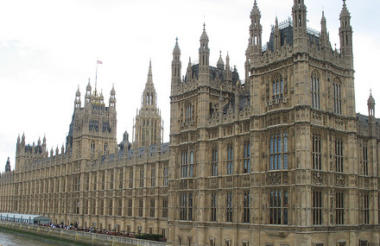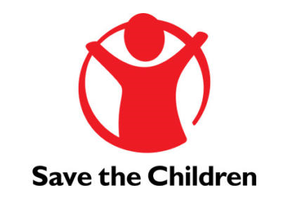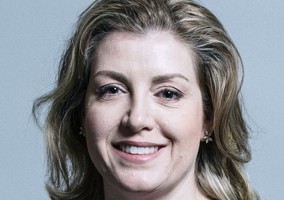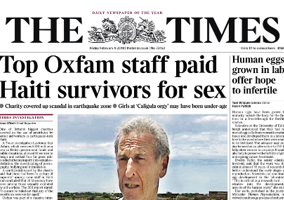Only 22 UK charities have registered with a global programme to combat abuse in the aid sector, more than two years after it was launched.
The scheme, backed by the government in 2018 as part of its response to the Oxfam scandal, is designed to stop abusers moving undetected between different aid organisations.
Ministers said at the time that its creation represented “unprecedented” cooperation across the international development sector, and later told “all UK aid agencies” to sign up. However, just a handful of charities have joined out of the thousands eligible to do so.
The UK government has not yet provided any funding to the programme, according to the group administering the scheme.
Reforms after the Oxfam scandal
The Inter-Agency Misconduct Disclosure Scheme is open to all aid bodies around the world and participation is voluntarily. It is coordinated by the Steering Committee for Humanitarian Response (SCHR) in Switzerland.
Organisations registered with the scheme commit to sharing information about former staff, so that someone found guilty of misconduct at one agency they cannot hide it from other employers.
The system was launched as a pilot in January 2019 after being announced at a high-profile aid summit in London in October 2018. The summit was called to agree new safeguarding measures after a series of abuse scandals in the sector.
Ministerial backing
At the summit Penny Mordaunt, then the secretary of state at the Department for International Development (DFID), said the measures represented “an unprecedented level of coordination” between government, charities and donors.
Mordaunt said that she hoped to see 100 organisations sign up to the disclosure scheme as quickly as possible.
In February 2020, Mordaunt’s successor at DFID, Anne-Marie Trevelyan, said that her “ambition is to have 200 charities signed up by the end of the year”.
Trevelyan said: “To have the best chance of succeeding we need as many charities on board as possible. I want to see all UK aid agencies signed up, so together we can work to stop vulnerable people being exploited, abused and harassed.”
However, the latest data on the scheme, published by SCHR this month, shows that only 73 organisations in total have registered worldwide. This includes 22 charities based in the UK.
Warning
The government was warned a year ago that the scheme was struggling, when an independent legal review said that “a strikingly low proportion” of eligible aid organisations had registered.
It said that “the vast proportion of individual aid organisations have not voluntarily adopted” the scheme, adding: “As and until measures are mandated by donors, the probability must be that individual organisations will not deliver the reforms sought.”
Responsibility for aid policy was passed to the Foreign, Commonwealth and Development Office when DFID was abolished in the summer. FCDO did not respond to requests for comment.
The SCHR said that 75 employment decisions had been blocked so far thanks to information shared through the scheme.
Aligning policy
Christian Aid and WaterAid, neither of which have registered with the scheme, said they hoped to do so in the future.
A spokesperson for Christian Aid said that the charity “believes in the scheme and the principles behind it, and once we have obtained the legal advice, and taken this through our safeguarding committee, we will be looking to join the scheme”.
Similarly, a spokesperson for WaterAid said: “WaterAid has adjusted our policies to align with the Inter-Agency Misconduct Disclosure Scheme.
“For example, we provide and request information relating to protection against sexual exploitation and abuse as standard on all our references.
“We have not yet officially signed up to the scheme as we want to ensure WaterAid can join as a global federation rather than just some of our offices joining.
“We are working on our internal systems to enable us to sign up and fully meet all the reporting requirements of the scheme.”
Legal questions
One major aid charity, which has not joined the scheme and asked not to be named, told Civil Society News that there were substantial legal obstacles to registering.
However, SCHR said that there were “no significant legal or practical constraints” to signing up.
Gareth Price-Jones, the executive secretary of SCHR, said: “The scheme is tackling a longstanding taboo around sharing misconduct data. It’s been understandable that UK charities wanted to see that it works before implementing it.
“However, with over 7,600 sets of misconduct data shared over two years, 75 hires stopped, and no significant legal or practical constraints emerging, we believe that the evidence is now there, and look forward to many more organisations working to implement the scheme in 2021.”
SCHR also said that the UK government had not “provided any funding to date”, although it has been supportive of the scheme.
SCHR added that it is finalising discussions with FCDO about funding to expand the role of the scheme’s coordinator from one day a week to a full-time position, at an estimated cost of around £50,000 per year.
Oxfam: It is an important scheme for aid organisations
Oxfam GB, which is registered, said it was “important that as many organisations as possible” take part.
Clifford Isabelle, the charity’s director of global safeguarding, said: “The misconduct disclosure scheme is a practical step to prevent people who have had concerns raised about sexual misconduct from moving around the sector.
“It is important that as many organisations as possible sign up.
“It provides future employers the ability to check if applicants have been the subject of concern regarding allegations of sexual harassment, exploitation or abuse, regardless of whether the investigation was completed.
“As we have made clear, there must be no place in Oxfam or other agencies for abuse. Working together as a sector is crucial and this initiative is an important part of our efforts to deliver on this.”
Save the Children: It has improved collaboration
A spokesperson for Save the Children International, which has also joined the scheme, said: “Save the Children played a leading role in the aid sector by proposing, three years ago, information-sharing among organisations during staff recruitment.
“This improved sector collaboration. It better protects our staff and the families we work with.
“The scheme covers sexual misconduct in the course of employment, and complements our other safer recruitment practices such as criminal records checks. We provide and seek references under the scheme to protect all those we work and come into contact with.”
Bond: Scheme’s success is ‘dependent’ on charities
Stephanie Draper, chief executive of the aid umbrella body Bond, said: “The Inter-Agency Misconduct Disclosure Scheme has the potential to make a real difference in preventing abusers from entering the development and humanitarian sector.
“In its initial year, the scheme had 14 implementing organisations piloting the scheme across parts of their organisations, a number which has now grown to over 70.
“Although these numbers are promising, we strongly encourage more organisations to join the scheme.
“Perpetrators must be kept out of our sector and the effectiveness of the scheme is truly dependent on the number of organisations, as well as donors and the private sector, who sign up to it.
Draper added that the scheme’s record helping to block the hiring of 75 “known abusers” had demonstrated its importance.
She said: “The SCHR is also working to implement the scheme in some of the countries and regions where humanitarian services are delivered and where there is a higher risk of abuse.
“Greater transparency between organisations is a positive step for the sector, especially if it contributes to known abusers being prevented from joining the sector.”
The 21 UK-registered charities signed up to the scheme are:
- British Red Cross
- Cafod
- Care UK
- Care International
- Cool Earth
- Doctors Worldwide
- Hope for Children
- Islamic Relief Worldwide
- Mines Advisory Group
- Oxfam International
- Oxfam GB
- Plan International
- Plan International UK
- SaferWorld
- Save the Children International
- Scottish Catholic International Aid Fund
- Tearfund UK
- Tree Aid
- VSO
- World Jewish Relief
- World Vision
- World Vision International
Editors note (10 March): This article has been amended to include British Red Cross among charities signed up to the scheme. The number of UK charities registered is 22 not 21.
- For more news, interviews, opinion and analysis about charities and the voluntary sector, sign up to receive the Civil Society News daily bulletin here.
Related articles












